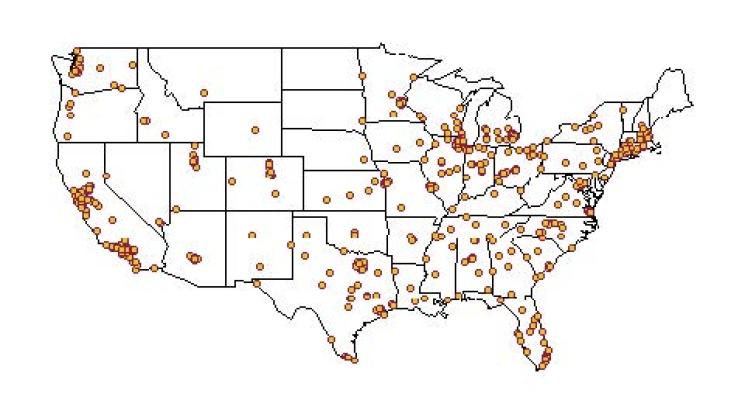
National Study on Technology and Civic Engagement in Local Governments
Focus area(s)
Featured Projects
Featured ProjectsThis research aims to develop and administer a national survey of state and local government agencies to examine the extent to which different agencies utilize technology (Internet and non-Internet based) to seek input from citizens and other stakeholders. This project is designed to provide several levels of information and knowledge about civic engagement and technology-facilitated civic engagement in government agencies in the US. The first level of information will be a baseline descriptive understanding of the status of technology for civic engagement in government agencies. At a second level, the project will provide an understanding of why civic engagement may be more prevalent in one government than in another. Finally, the project will provide a navigable dataset that will include survey data, website data, and other institutional data (e.g. census data) that can be made available to partners or other groups for further analysis. The combination of baseline information, explanatory information, and data enables a national discussion on technology and civic engagement, and serves as a valuable resource for agencies, citizens and other stakeholders across the US.
Project reports:
Memos (2016)
Citizen participation in U.S. local governments
Local governments are answering the call for more open, accountable, and transparent decision making that includes citizen participation. Citizen participation in local governments is credited for informing government decision making, facilitating decision implementation, increasing public trust and fostering citizenship values.
Promoting data sharing in U.S. local governments
Politicians, policy makers, and citizens are increasingly paying attention to public organizations sharing data with stakeholders, including other departments in the city, governmental organizations outside the city, and private for profit and nonprofit organizations. Data sharing between governments and stakeholders is expected to promote innovation, improve service provision, increase government accountability, and create more opportunities for public participation in the policy-making process.
Hiring women in U.S. local governments
The International City/County Management Association reports that 30% of local government department leaders are women and a mere 13% are Chief Administrative Officers (2015). The underrepresentation of women in government has led to initiatives to reduce barriers and increase the representation of women in government.
Is There a Generational Gap in Technology Use in Government?
Local governments are working to utilize diverse technologies to serve citizens. Among all types of technologies, those aimed at facilitating communication are increasingly attractive to local governments. In the general public, we see that generational differences shape technology use. For example, only 58% of the Silent generation utilizes Internet, whereas 95% of the Millennials went online in 2010. (Pew Research Center, 2010). We thus ask: is there a generational gap in technology use among government managers?
Memos (2012)
 benefits_of_online_social_networks.pdf
benefits_of_online_social_networks.pdf catching_up_to_tv.pdf
catching_up_to_tv.pdf connecting_to_citizens.pdf
connecting_to_citizens.pdf connecting_with_technology.pdf
connecting_with_technology.pdf dollars_and_democracy.pdf
dollars_and_democracy.pdf information_security_risk.pdf
information_security_risk.pdf internal_technology_use_and_civic_engagement_.pdf
internal_technology_use_and_civic_engagement_.pdf public_managers_and_social_media.pdf
public_managers_and_social_media.pdf social_media_tools_for_planning_and_policy.pdf
social_media_tools_for_planning_and_policy.pdf
Presentations:
Peer-reviewed publications:
- Wang, S and MK Feeney (2014) Determinents of information and communication technology use in municipalities. American review of Public Administration.
- EW Welch and MK Feeney (2014) Technology in government: How organizational culture mediates information and communication technology outcomes. Government Information Quarterly. 1-Oct-2014. DOI: 10.1016/j.giq.2014.07.006
- Feeney MK and EW Welch (2014) Technology-Task Coupling: Exploring Social Media Use and Managerial Perceptions of E-government. American Review of public Adminsitration. August 20 2014 doi:10.1177/0275074014547413.
- de Oliveira, G and EW Welch (2013) Social Media Use in Local Government: Linkage of Technology, Task, and Organizational Context, Government Information Quarterly, 30(4): 397-405.
- Feeney, M.K. and Welch, E.W. (forthcoming).Implementing Information and Communication Technologies (ICT) in public organizations: The Mediating Effects of organization routineness and centralization on the relationship between ICT and Managerial Outcomes. Dg.o ‘13 Proceedings of the 14th Annual International Conference on Digital Government Research. Pages 38-45.
- Welch, EW. (2012). The Rise of Participative Technologies in Government. InTransformational Government through eGov Practice: Socio-economic,Cultural, and Technological Issues. Edited by M.A. Shareef, N. Archer, Y.K. Dwivedi, A. Mishra, and S.K. Pandey, pp. 347-367, Bingley, United Kingdom: Emerald Publishers.
- Li, M.H. and Feeney, M.K. (2012). Adoption of Electronic Technologies in U.S. Local Governments: Distinguishing Between e-Services and Communication Technologies. American Review of Public Administration. DOI:10.1177/0275074012460910.
- Feeney, M.K. (2012). Organizational Red Tape: A Measurement Experiment. Journal of Public Administration Research and Theory. DOI: 10.1093/jopart/mus002. First published online: March 23, 2012.
- Feeney, M.K. and Welch, E.W. (2012). E-Government and Perceived Outcomes for Local Government Managers. Public Management Review, 14(6): 815-83314(6): 815-833.
- Shin, E. (2012). Attitudinal Determinants of E-Government Technology Use Among U.S. Local Public Managers. Proceedings of the 45th Hawaii International Conference on System Sciences (HICSS), pp. 2613-2622.
- Welch, E.W. (2012). The Relationship Between Transparent and Participative Government: A Study of Local Governments in the United States. International Review of Administrative Sciences, 78(1): 93-115.
- Grimmelikhuijsen, S. and Welch, E.W. (2012). Developing and Testing a Theoretical Framework for Computer-Mediated Transparency of Local Governments. Public Administration Review, 72(4): 562-571.
